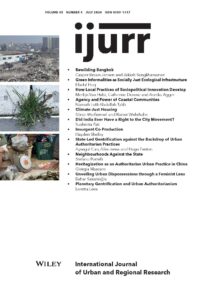Focusing on the nexus of climate and housing policy, this article analyzes the socio-spatial consequences of urban climate mitigation policies and the resultant need to broaden the concept of climate justice. By using the example of energy retrofitting in a low-income district in Kiel, Germany, the article examines cities’ dependence on real estate companies to reach low-carbon goals in a privatized housing market and the (potential) need to provide incentives for investment. As the case study shows, this can lead to a highly sensitive confluence of climate policy, private real estate investment and neighborhood development policy, which leads to a higher financial burden as well as the potential displacement and further political marginalization of current tenants. In light of these results, the article argues for the application of a climate justice frame in analyses of urban climate policies that integrates housing justice with spatial justice. Specifically, it calls for the right to climate-just housing; that is, for the right to affordable housing to be connected with the right to energy-efficient housing in one’s own neighborhood. This implies the right to information and to urban space as political space, which in turn means the politicization of the targets, strategies and, not least, spaces of urban climate policy.
Details
Written by:
Sören Weißermel, Rainer Wehrhahn
Digital Object Identifier (DOI)
https://doi.org/10.1111/1468-2427.13243
About DOI

